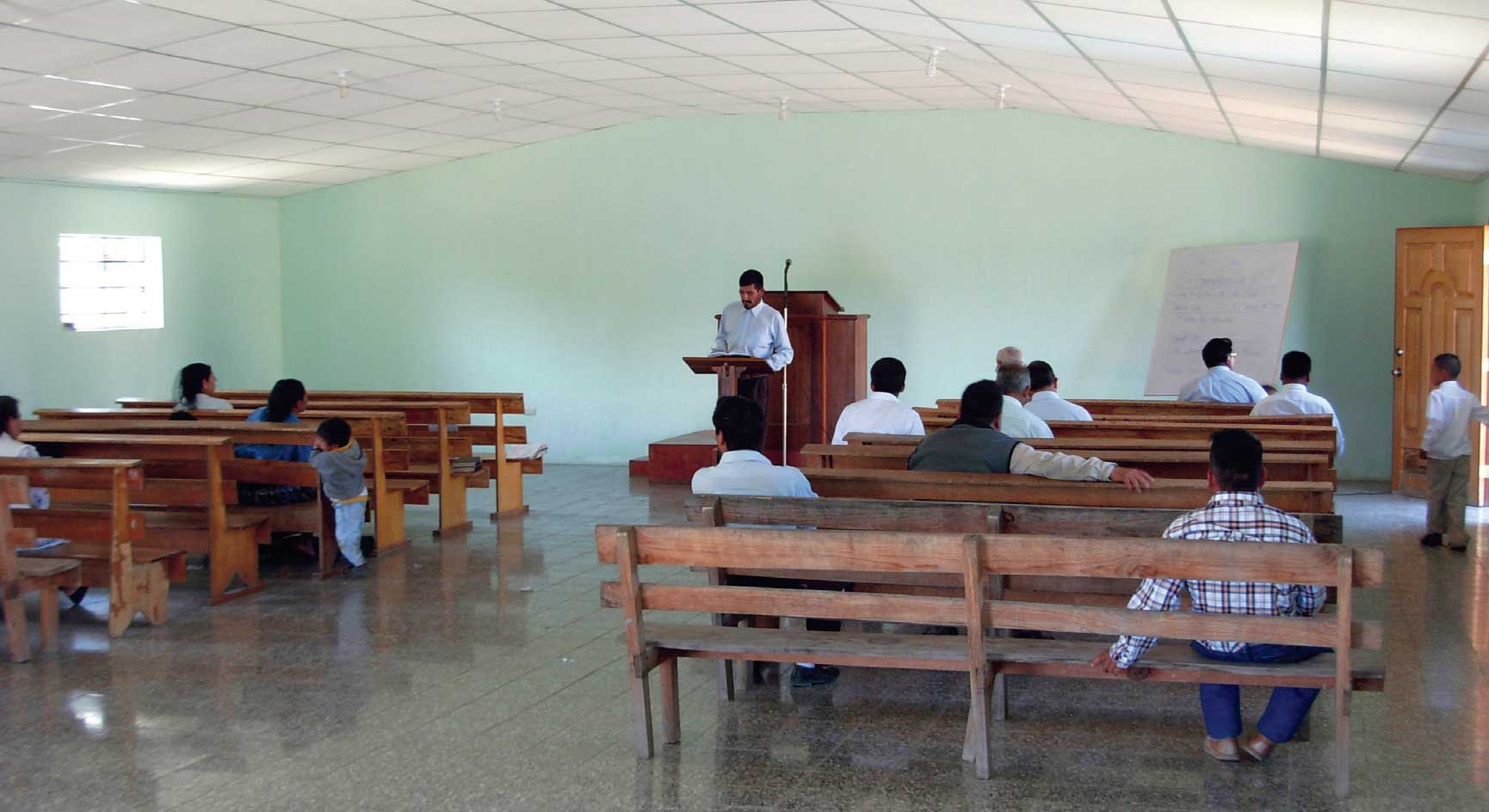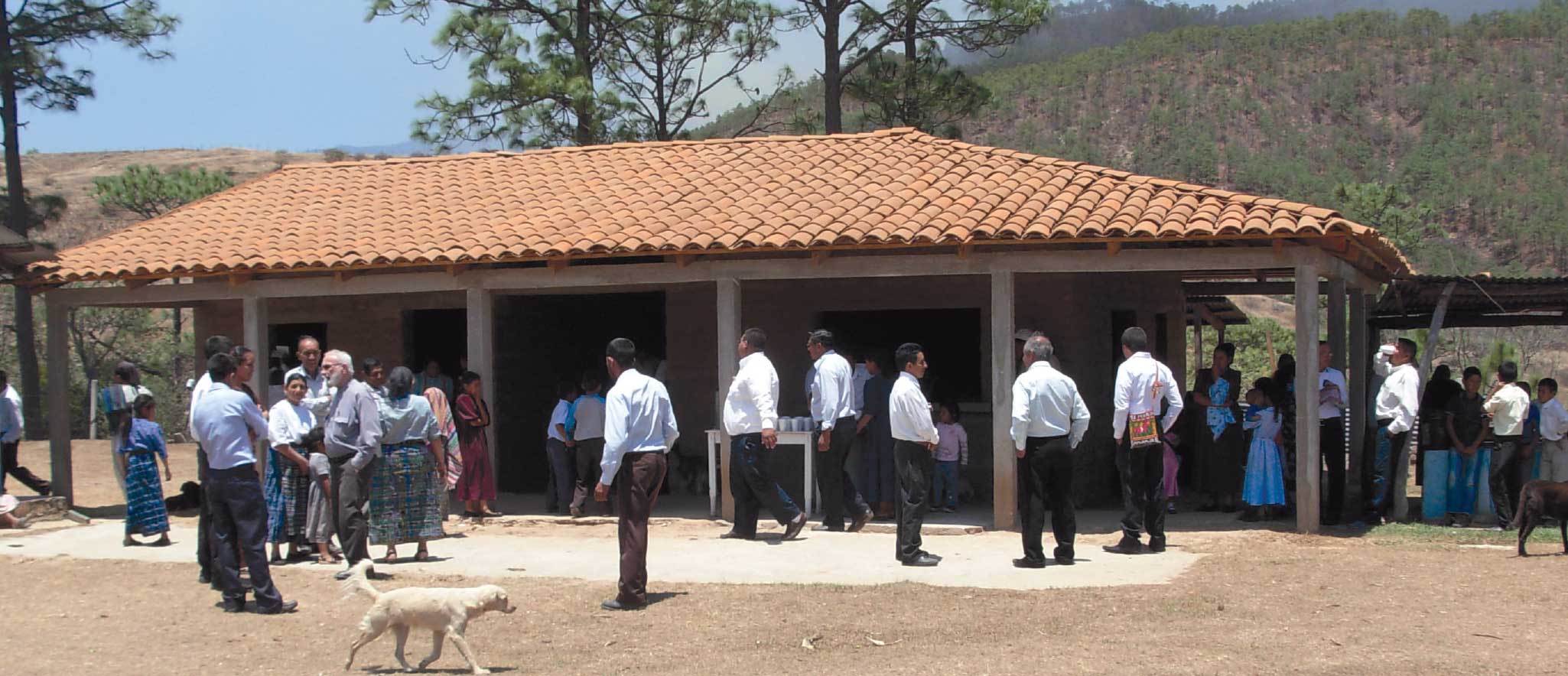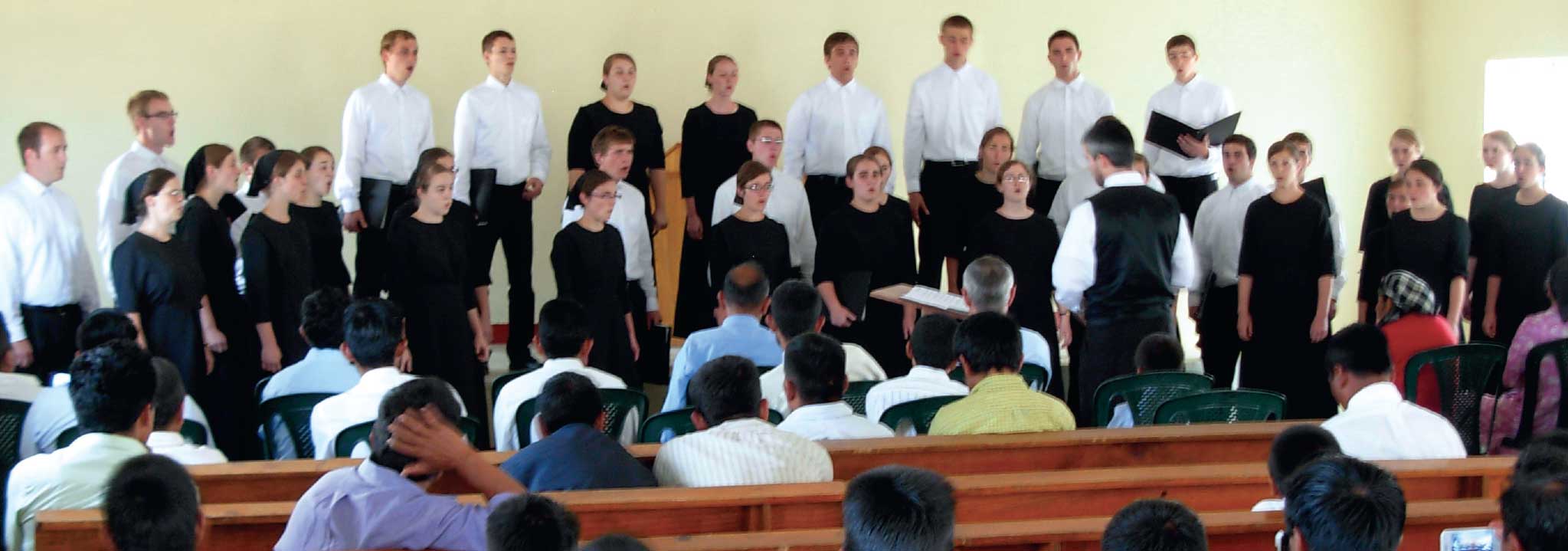
As part of a vision for a sustainable, national church, the mission is selling the airplane.
A Backward Glance, a Forward Focus
During a board meeting in February, Harold Kauffman – now nearly ninety and still serving in Guatemala – was asked, “When you began the work over forty years ago, did you envision MAM to be what it is today?” Harold thought for a minute. “No,” he said, “I couldn’t envision what forty years would bring. I only knew what the Lord’s will was for me then.”
Hindsight is excellent, foresight is clouded, and only God knows about the next forty years. As we consider the future, we welcome what the last forty years have taught us. We plan for tomorrow with an awareness of our history and a deep sense of our need for the Lord’s direction.
Watching a mission mature into a church is a little like watching a child grow up. A parent could almost wish the child would always be a child: innocent and sweet, wondering and trusting. But parents know better. Unless children mature, they are doomed to a limited, frustrated life.
Sometimes a child resists growing up. He enjoys his lack of responsibility and finds security in Dad’s decisions. He doesn’t mind someone bigger paying his rent and putting food on his table and thinking for him. His dreams of independence somehow leave out the reality of responsibility.
As individuals, our Guatemalan brethren are quite mature. Their energy in sharing the Gospel surpasses mine; their love for the Lord puts mine to shame. I have observed in them humility and faith, intensity in prayer, and love for God’s Word. I count myself blessed to have lived among them, and I owe them much for their example.
As a functioning entity, the sisterhood of Guatemalan churches is a work in progress. For many years there was “The Church” and “The Mission.” The church was the membership and the leadership: the place of spiritual food, instruction classes, and baptisms. But all things material or financial or organizational were served up at the mission director’s desk. The mission is where we sent the electric bills, where we called with maintenance questions, and where pulpits and benches and school desks were made.
When a mission is young and energetic and blessed with souls for the kingdom, it is easy to forget that sometime in the future will come a painful disentanglement of that which is national and that which is foreign. Although the missionary is somewhat aware of national customs and realities, he often fails to realize that his foreign way of thinking is a large factor in his decisions. He builds like a foreigner, plans like a foreigner, and spends money like a foreigner. National brethren soon grow accustomed to this reality, and the concept of foreign leadership, foreign customs, and foreign funds is quickly entrenched.
Even in this environment, the church might continue to grow and be blessed. On a spiritual level, nationals and foreigners are united; as brethren they are at peace—as long as the arrangement lasts.
Over the years and decades, maturing continues to happen—not only in individuals, but in the body. In his book, Missionary Methods: St. Paul’s or Ours, Roland Allen suggests that there is an optimum time for a newly-founded church to assume its own leadership. If a mission group squelches the church’s desire to express this maturity, the relationship between mission and church is cemented into a parent/child relationship in perpetuity.
When a church reaches this maturity, it is truly a blessing from God. The highest goal of an evangelistic mission effort should be to not only bring individuals to spiritual maturity, but also to cement them into a working body under the Head. Yes, there may be spasms of frustration along the way, but such is the process of maturity—just ask the parents of any teenager. But unless parents are willing to acknowledge their children’s maturity—even allowing them the freedom to fail—they are doomed to be parents forever.
And so comes a day of reckoning. When a son moves to the neighboring farm, he and dad must sit together and decide some things. When a mission observes the maturity and wisdom of the church it has helped plant, together they make some choices about their ongoing relationship and the church’s future.
During this this time of disentanglement, the differences between what is foreign and what is national become strikingly important to consider. Our centralized approach to church life – is it sustainable for a national church? The way we bus school children, fund institutes, do committees, run clinics, fly airplanes, and travel around the country—is this an asset to an indigenous church or a millstone around its neck? Will the programs we North American workers start and promote only exist as long as we oversee and fund them, or will they continue to be a practical asset in a Guatemalan church?
It is here that the last forty years loom large—where forty years of choices are called into account. Like a father who wistfully remembers the past—both his good decisions and his poor judgment—so it is easy to criticize ourselves for not doing a better job. Yet God has blessed those years of effort with souls and churches and national ministry, so we try not to be too harsh in our self-criticism. Rather, we attempt to understand the spiritual dynamics of love and prayer under which the church grew the best.
In February, the board listened to church leaders and mission workers. The persistent questions, both voiced and unspoken, were simple: “What is our vision? What does the mission’s future look like?”
Our mission statement is posted on the mission kitchen wall for everyone to see: The purpose of Mennonite Air Missions is to evangelize and establish indigenous churches in Guatemala, Central America, and other Latin American countries . . . Yet what’s easy to read is difficult to visualize and even harder to attain in practice. It’s even hard to measure. If a church has national members and national leaders, yet depends on foreign finances and oversight, is it yet indigenous?
In seeking the Lord for the moment and for the future, the board feels that His will includes supporting the Guatemalan church on a path toward greater maturity and autonomy. Several recent decisions reflect that direction.
First, we reaffirmed that the board’s role in Guatemalan church life is an advisory role, not a controlling one. Guatemalan church leaders bear responsibility for the spiritual health and direction of the national churches. By extension, this means that the board will refrain from dictating church standards and will recognize the national brethren’s responsibility for them. We trust that the positions and applications they choose will allow us to continue to relate to them as sister churches. The board also asks that North American workers come under the requirements and oversight of the Guatemalan church while in Guatemala.
Second, we invite our national brethren to be more directly involved in mission decisions and oversight. Instead of the traditional “director holds the purse” approach, the ministerial group recently organized committees to oversee different areas of church life. After submitting a budget to the ministerial body, these committees (school, institute, property management, etc.) are then given mission funding to carry out their responsibility. They choose the projects, write the checks, and handle dilemmas that may arise. They not only pay the teachers, they hire and fire them. And then they give account to the ministerial group for every quetzal they spend. It’s a system built upon transparency and trust, and although there have been misgivings, there have also been early successes.
Third, we unanimously chose to sell the iconic mission airplane. Wings served MAM well in the early years. Harold Kauffman was able to visit several remote outposts in a single Sunday and bring teaching and encouragement. Even after roads were built, an airplane was a useful resource and a real time-saver. But the country has changed since those years, and the plane has become more of a convenience than a need. It has proved expensive to maintain and operate, and it is difficult to keep an experienced pilot on the field.
But expense alone did not lead us to this decision. In thinking ahead to what a Guatemalan church might look like, we felt that the airplane would not fit within the parameters of an indigenous church. In Guatemala, airplane ownership is exclusive to the wealthy. Based on the fee a mission aviation group would charge, a single flight to the Peten would cost the equivalent of forty-five bus tickets. It saves time, but it will never be the Guatemalan way.
These changes do not mean that the mission is backing away from the churches. We envision the mission walking beside the church as long as the Lord allows. The sixteen churches of our fellowship are quite diverse: some are small, others larger. Some lack local leadership, some do not. We hope to help provide leadership where it’s lacking, to encourage national leaders, and to help with counsel and teaching. And we haven’t given up on outreach. As the needs of established churches are met, we still want to reach new areas with the Gospel.
As God looks upon forty years of mission work, I believe both the mission and the church are important in His eyes. Yet the mission organization is but a tool, while the church is the final product. Like a new building is permanent while the scaffolding around it is temporary, so the church of Jesus Christ is eternal while the mission effort that planted it has a measured span of usefulness. Yet we believe that it still has a role to play in extending the kingdom, and we seek to understand what that role should be.
The grace of God is the only power that can grow a church. The grace that brings her to life must be the power that allows her to walk; otherwise she is doomed to a handicapped existence. May we not build into her the very handicap that will limit her for life, but lead her to the dependence upon the Lord Jesus that allows here to flourish.
~ Brian Yoder

Inside the chapel at Mixcolajá
Mixcolajá
In 1975 the first seeds of God’s Word were planted in Mixcolajá when a few brethren visited to encourage a woman named Josefina, who had been bedfast for five months. When they brought her the message of Jesus, she accepted him as her Saviour and received spiritual and physical healing! She was the first member, followed by Oliberta Girón.
Vidalia Marroqin was the third member, and thus the church grew. Vidalia left her cancer-ridden body and went to meet the Lord ten years ago.
Guillermo Santos was the first pastor there, followed by Carlos Urizar and Rafael Segura. When Rafael’s teenagers chose to reject the Gospel and caused trouble in the community, Rigoberto Portillo took his place and served there for seven years. These four pastors were Guatemalans that had moved in from other areas.
During the war in 1981-82, Ismael Quiñones from San Andrés traveled to Mixcolajá to give spiritual encouragement as other leaders left for their protection. In December of 2000, Rigoberto moved closer to the city when his wife Rosa’s health failed, and Lamar Hursh took his place and served there for six years. At that point, church attendance was about fifty or sixty and membership was in the twenties.
During those years the mission began ministerial training classes, and Humberto Mux, a brother from Mixcolajá, was chosen to be a worker in training. After completing the classes and working with Lamar for a year or two, he was commissioned as minister for the congregation. Having realized the goal for national leadership, Lamar and his family returned to the States. Humberto was ordained four years ago and has been faithfully serving the Lord in leadership there for eight years now. What a blessing!

The Mixcolajá brethren gather for a fellowship meal.
The congregation has not grown much in size over the last fifteen years, but during a recent visit we were blessed to find brothers and sisters faithfully serving God in spite of difficult circumstances. Sister Oliberta, the second member, is still serving the Lord with all her heart, and her spiritual strength is a blessing to witness! Sister Maria has also been serving the Lord faithfully. Her husband was a drunk who accepted the Lord a few years ago, but during a discouraging time he went back to drinking, then hung himself. With heartrending sobs she told us how she struggles with memories of how he looked when she found him. Yet her face is radiant with the joy of the Lord! Her three older Christian daughters are working to help support the family.
Sister Blanca de Natereno is another faithful sister who serves the Lord with a sincere heart, in spite of an unfaithful, drinking husband who does not provide for her and the seven children. Her twelve- and thirteen-year-old daughters work to earn their education.
It is very difficult to make a living in this area. The dry season is long and hard, water is always scarce, and the cost of shipping things they can produce is so high that it quickly eats up any profits. Some sell firewood to provide, going farther and farther away to find it. If they don’t replace what they are using, there will soon be none left.
A day’s work earns thirty-five quetzals: about $4.95. How many of us could provide for our family with an income that size?
The church is also blessed to have a number of families as part of the body of Christ. When both husband and wife are serving the Lord, it adds so much stability. In our recent visit we were blessed to see the spiritual growth in some of these couples! While the numbers have not increased, we feel that the spiritual stability is increasing in some of the members!
~ Lamar Hursh Family

Jared Kropf
Jared Kropf, from Halsey, Oregon, came in early April for a term of service in Guatemala. He is a member at the Harrisburg Mennonite Church. Jared moved directly to Santa Rosita, where he will begin working beside Daniel Eby with the youth, church, and people of the community.

The SMBI Chorus sharing a program.
The Sharon Singers from the Sharon Mennonite Bible Institute visited Guatemala and gave eleven programs in different churches, as well as sharing songs in parks and schools. The group of thirty-eight arrived in El Salvador and, after sharing there, did a lot of traveling around Guatemala, encouraging the churches with singing.
Download The Entire May/JuneNewsletter

